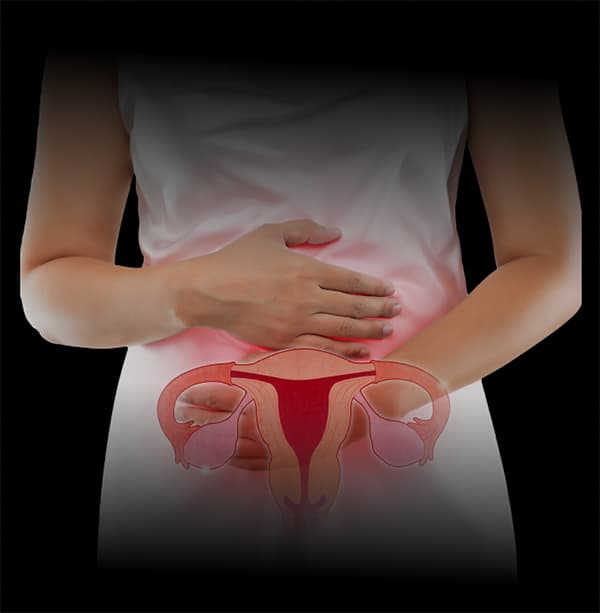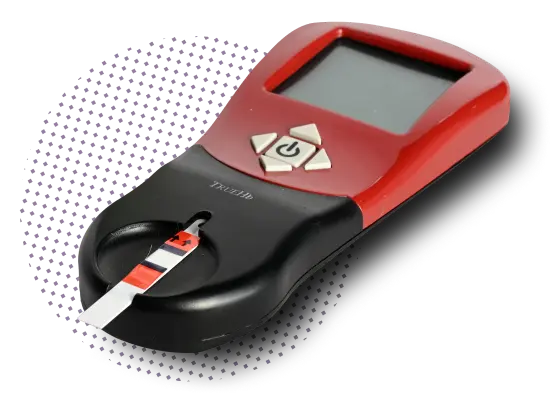Heavy bleeding not only lowers your hemoglobin levels but also takes away the glow of your skin. Monitoring hemoglobin during heavy flow helps you to keep your body and skin healthy.


Hemoglobin is found in red blood cells that carry oxygen to different parts of the body. A female who is suffering from menorrhagia experiences heavy menstrual bleeding. Heavy flow lowers the hemoglobin levels in the blood and causes anemia. The female may face symptoms like fatigue, weakness, pallor, shortness of breath, feeling cold, brittle nails, and dizziness.
When the hemoglobin levels drop due to heavy menstrual flow, doctors may recommend several treatments, such as iron supplements or medications to control bleeding, hormonal therapies, or surgical procedures. Assessment of hemoglobin levels is important to prevent hemoglobin loss and helps in the diagnosis and management of menorrhagia.
When a female is on medication during menorrhagia, hemoglobin levels are checked to monitor the effectiveness of treatments to reduce the heavy flow and improve hemoglobin levels. Based on your hemoglobin levels, your doctor may recommend adjustments to treatment plans if required.
Checking hemoglobin levels during menorrhagia can effectively monitor the drop in hemoglobin levels and help you to reduce the severity of heavy bleeding and prevent the risk of developing anemia.
I have some problem with my periods. I feel so week and tired all the time during my periods because of heavy flow and excessive bleeding. I did not know I was at risk of anemia. TrueHb gave me peace of mind during my heavy periods as I can assess my hemoglobin levels. With this, I have started taking steps to prevent anemia and know my health condition.
TrueHb is a wonderful home-based device that has made my menorrhagia condition much simpler. I can monitor changes in my hemoglobin levels without frequent clinical laboratory visits.
I highly recommend TrueHb for anyone who is dealing with menorrhagia. It gives you your valuable health insights and helps you to know the effective ways to manage your condition before your condition worsens.
As a corporate professional, every single day is a new struggle where I need to be more focused and concentrated at my work. Anemia has not only impacted my health but my professional life suffers as well. My daily struggles with fatigue, difficulty to concentrate at work, and tiredness have hampered my work productivity. TrueHb has made my personal and professional life much easier that allows me to monitor my hemoglobin levels at home or work. TrueHb reminds me that health and productivity are interconnected.

US Patented Technology| Instant Results| Wide range of measurement| Accuracy as per US CLIA guidelines|
In menorrhagia, heavy menstrual bleeding leads to excessive blood loss and then lowering the hemoglobin levels. TreuHb is used to measure the hemoglobin levels and management of the condition. In case of dietary changes, TrueHb helps the female to monitor and let the female know the increase and decrease of HB
The normal range for adult women is around 12 to 15.5 g/dL. In menorrhagia hemoglobin levels drops due to prolonged and heavy bleeding.
Yes, heavy bleeding lowers the hemoglobin levels thus, causing anemia in females with menorrhagia.
Treatment options include iron supplements, dietary changes, and medications to control heavy flow.
Fatigue, weakness, pallor (pale skin), shortness of breath, dizziness, brittle nails, headaches and low work productivity are the few symptoms of anemia in women with menorrhagia.
Hemoglobin levels monitoring is essential for the diagnosis and management of the menorrhagia condition effectively. It provides valuable information about the overall health of the female and treatment efficacy.
A small drop of blood sample is required to measure hemoglobin levels by TrueHb kit. The blood can be withdrawn by simple pricking.
Yes, heavy menstrual bleeding can be observed in medical conditions such as uterine fibroids, endometriosis, or bleeding disorders. Menorrhagia may also be related to hormonal changes.
Yes, menorrhagia can affect women at any age except women who are on menopause.
Untreated menorrhagia and low hemoglobin levels can lead to complications such as anemia-related symptoms, fatigue, weakness, difficulty in concentrating in studies or at work, hampered work productivity, and decreased quality of life.
Hormonal contraceptives, such as birth control pills, hormonal IUDs, and hormonal injections, are often used to manage menorrhagia.
Women with menorrhagia can be proactive by keeping track of their menstrual flow and monitoring hemoglobin levels regularly.
Recognizing symptoms is vital for addressing hemoglobin deficiency. If you've noticed any symptoms, please provide your email/phone number to recieve your symptom results for a free consultation with us if you are concerned about your health.
The content and information about the patented hemoglobinometer device displayed on this website are proprietary. Any unauthorized use, copying, or disclosure of this information, without explicit permission, is strictly prohibited and may result in legal consequences.
Copyright @ TrueHb All rights reserved 2024